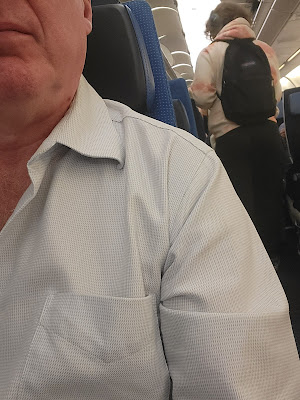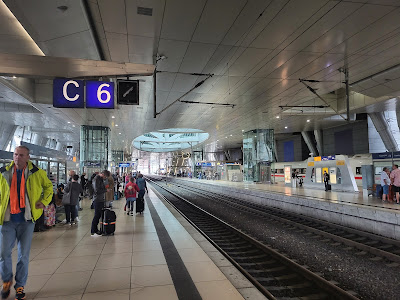Recently I had to get from Hannover to Brussels. This looked like a good opportunity to compare rail and air options. In order to be sure to capture all the costs (carbon emissions, time and money), I decided to calculate hotel to hotel rather than gate to gate or platform to platform.
In both cases I included walking from my hotel to Hannover central train station (20 minutes). The train ride to the airport is 26 minutes with departures every 30 minutes, so I allowed 40 minutes for that trip. I also allowed 20 minutes in the station for locating the right platform, whether the inter-city train or the one to the airport. Additionally I assumed one should get to the airport 90 minutes early. At Brussels airport I allowed 20 minutes to get to the train station in the basement of the airport, 20 minutes to find the right platform and 20 minutes for the train to Bruxelles-Noord. From there, it was a 10 minute walk from the platform to the street and another 10 minutes to my hotel.
Lufthansa offers an early morning option through Munich, total time 7h30 of which 2h30 in the air and with a connection time of 50 minutes. (While the point of this note is not scheduling convenience, note that this option also meant leaving the hotel at about 3:30 am.) The alternative, an evening flight through Frankfurt, involved only 2h00 in the air, but 1h45 on the ground, for a total time of 7h55. (In this scenario I'd arrive at the hotel at midnight).
So by air: two inconvenient flight times and a total travel time between 7h30 and 8h00; arriving at the airport an hour early instead of 90 minutes would reduce this by 30 minutes. Prices were about $300 Canadian before seat selection or a checked bag (no carry-on bags allowed on these internal flights, apparently, even in business). $330 gets a seat and a checked bag, but the timing shown here does not include waiting around the baggage carousel in Brussels.
(The photo is of me on the red-eye on my way to Europe).
The train leaves Hannover at a civilised hour of 10:31 and gets to
Bruxelles-Noord directly, with 33 minutes to change trains in Köln, at 15:26. So this is just under 5 hours in transit (at speeds
up to 250 kph), versus two or two and a half hours in the air. But the
total travel time by train was just under 6 hours door to door. Cost in
first class (which basically gets you an assigned seat with a bit more
legroom) was just over 100 euros.
In all fairness, the 33 minute time to change trains in Köln was whittled down to 6 minutes by delays en route. Deutsche Bahn arranged for the two trains to be facing each other across a platform so no need to run to another platform, but still this was unsettling. Like you, I was under the impression the Germans could get the trains to run on time... and the train continuing to Brussels was delayed by about 15 minutes. Nonetheless the train is the big winner on cost and time in this case, and probably on carbon emissions as well as both trains were electric and thus dependent on average grid emissions.
(The photo is the train station at Frankfurt airport, taken on my way to Hannover. This train was also delayed! Almost 30 minutes in fact. Shocking.)
So the moral is two-fold. First, trains can be cheaper, faster and (presumably) better from a carbon perspective than short hauls, especially if you need to change planes -- availability of a direct flight would have changed this calculation significantly. Second, don't book trains with excessively short connecting times as Deutsche Bahn doesn't know if you've actually gotten on the next train (unlike the plane where your boarding pass is scanned at the gate) and can't be counted on to hold it, even for a minute or two.
So where's our high speed rail from Quebec City to Windsor? Tied up in politics and (possibly) in not wanting to cripple Air Canada's cash cow (the Montreal-Toronto run that I know so well). Sad.
In the meantime, safe travels!


No comments:
Post a Comment